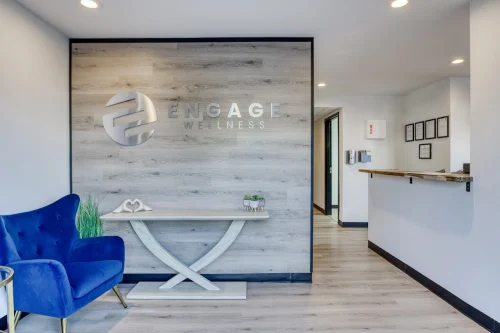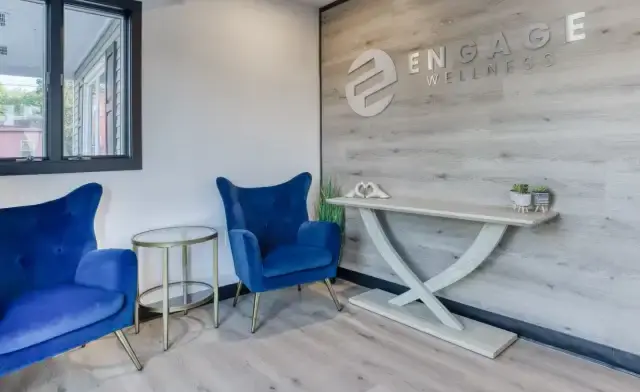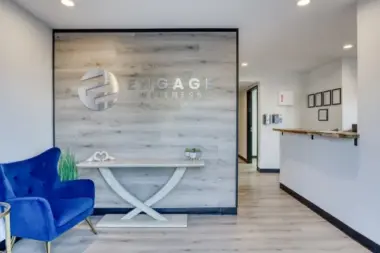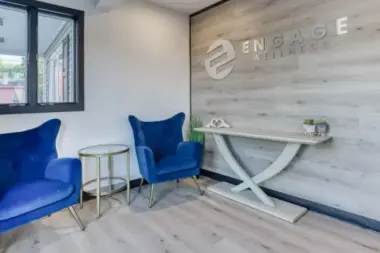About Engage Wellness Massachusetts Drug & Alcohol Rehab
Engage Wellness is a dual diagnosis substance use and mental health treatment center for adults in Acton, Massachusetts. They’re an LGBTQ+ inclusive facility with programs for veterans led by veteran staff. Flexible treatment options include both in person and remote formats for some programs.
As a facility accredited by The Joint Commission, they accept most major insurance plans. They also offer flexible payment options and insurance verification to make care more accessible.
Medication and Therapy Support Recovery
They provide medication assisted treatment here with FDA approved medications like buprenorphine, methadone and naltrexone to help restore brain chemistry and reduce cravings. Therapy helps build coping skills and addresses underlying causes while clients connect with others in recovery. I think it’s helpful that family involvement and long term planning are encouraged to help rebuild relationships and support lasting recovery.
Outpatient Levels of Care
I noticed that they offer three levels of outpatient programs, including standard outpatient care, intensive outpatient programming and day treatment. Each level differs in intensity. Standard outpatient offers fewer weekly sessions and more flexibility, while intensive outpatient and day treatment provide more structured therapy, medical support and time in treatment.
Personalized Treatment and Ongoing Support
Clients praise Engage Wellness for its compassionate and knowledgeable staff. Many appreciate the personalized treatment plans and ongoing support. They say this helped them achieve meaningful personal growth and sustained sobriety. One client said, “I felt welcomed from day one in an environment that’s supportive, nonjudgmental and empowering.”
Central Location in Acton
The Acton Arboretum and nearby gardens and nature trails offer a peaceful setting for reflection and healing. Nara Park is also close, with picnic spots and a serene pond that encourage outdoor activity and time in nature. Located in the heart of Acton, it’s within easy reach for people living or working in Middlesex County. The quiet suburban setting adds a sense of safety and calm that supports recovery.
Latest Reviews
See AllRehab Score
Gallery


















Accepted Insurance














Other Forms of Payment
Self-pay involves paying for treatment out of your own pocket. You can use savings or credit, get a personal loan, or receive help from family and friends to fund your treatment. If you don't have insurance or your insurance plan doesn't cover a specific program, self-pay can help ensure you still get the care you need.
Private insurance refers to any kind of healthcare coverage that isn't from the state or federal government. This includes individual and family plans offered by an employer or purchased from the Insurance Marketplace. Every plan will have different requirements and out of pocket costs so be sure to get the full details before you start treatment.
Medicaid is a state based program that helps lower-income individuals and families pay for healthcare. Medicaid covers addiction treatment so those enrolled can use their coverage to pay for rehab. When a program accepts Medicaid the client often pays very little or nothing out of their own pocket.
Medicare is a federal program that provides health insurance for those 65 and older. It also serves people under 65 with chronic and disabling health challenges. To use Medicare for addiction treatment you need to find a program that accepts Medicare and is in network with your plan. Out of pocket costs and preauthorization requirements vary, so always check with your provider.
Military members, veterans, and eligible dependents have access to specific insurance programs that help them get the care they need. TRICARE and VA insurance can help you access low cost or no cost addiction and mental health treatment. Programs that accept military insurance often have targeted treatment focused on the unique challenges military members, veterans, and their families face.
Per session payment lets you pay for each treatment at the time of service. You may also pay for a certain number of sessions up front and then pay for more if needed. This format allows you to tailor the financial investment to your specific needs and avoid having a large lump sum payment due at the end of the treatment program.
Addiction Treatments
Treatments
A person who has alcohol use disorder (alcoholism) builds up a physical tolerance to alcohol. If they try to stop drinking, they experience withdrawal symptoms. Treatment is available for this condition, through alcohol rehab in Massachusetts. Treatment options include AA, detox, counseling, medication, residential programs, and outpatient treatment. Social and family support systems are crucial during and after treatment of any kind.
Addiction is a highly complex problem, and drug rehab in Massachusetts is often necessary to address it. These programs treat physical, mental, and relational issues that are involved. Treatment empowers individuals to manage these issues without the use of drugs.
In Massachusetts, dual-diagnosis addiction treatment programs provide specialized care for individuals with co-occurring substance use disorders and mental health conditions. Levels of care include detox, residential drug and alcohol rehab, and outpatient programs. Each program and level of care includes a comprehensive assessment, individualized treatment plan, and evidence-based therapies, like cognitive behavioral therapy, or dialectical behavioral therapy. You'll also attend recovery support groups, receive family counseling, and beneficial skills training to help you promote your mental health and sustain long-term recovery.
In Massachusetts, substance abuse treatment programs can help to address addiction and, if relevant, any co-occurring mental health conditions. Programs include outpatient, inpatient, dual-diagnosis, and partial hospitalization. You'll receive therapies like cognitive behavioral therapy, or dialectical behavioral therapy, and sometimes complementary therapies like acupuncture and mindfulness-based therapy. By attending skills training and recovery groups you'll build a strong foundation for your recovery and strengthen your support network, increasing your chances of long-term recovery success.
Mental health services are essential during treatment for drug and alcohol addiction, whether you receive treatment in an inpatient or outpatient setting. While receiving inpatient care, you can expect to have round-the-clock access to mental health therapists and medical staff. Additionally, you will likely receive a number of different therapies and mental health options like individual and group counseling, addiction and relapse prevention education, and coping skills training.
